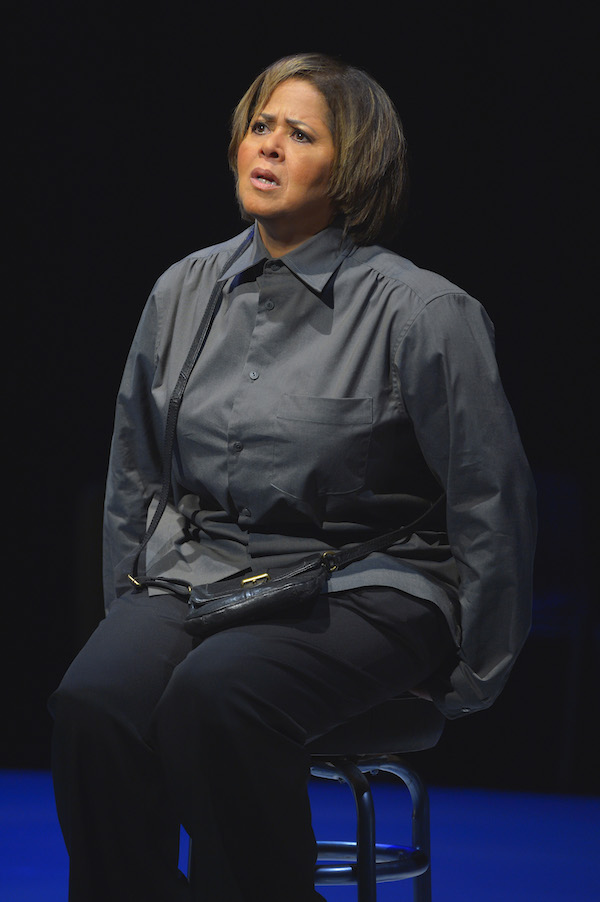
30 Jul Anna Deavere Smith Takes on School-to-Prison Pipeline

Review, Edgardo Cervano-Soto
Many students may not have heard of the “school-to-prison pipeline,” but they experience the reality up close. It is a series of steps the criminal justice and education system are taking to over-police, criminalize and punish students of color, specifically black and Latino students. This could include funding police presence in schools instead of providing therapists and counselors; resorting to suspensions and expulsions rather than mediation; expanding juvenile halls instead of improving public schools; or stereotyping certain students as “problem students”- a label that becomes racialized and near impossible for the student to shed.
Playwright, actress, documentarian and MacArthur “genius” award winner Anna Deavere Smith–known for bringing American testimonies to the stage–fixes her gaze on the this pipeline – and asks what we as the public can do about it.
The creator of critical works including Twilight and Fires in the Mirror (both of which highlighted racism in the United States), continues her investigation into the American condition reckoning with racism with her newest performance, Notes From The Field: Doing Time in Education, now playing at the Berkeley Rep. In this play, Smith utilizes her process of finding individuals closest to the narrative, interviewing and filming them, studying their mannerisms, memorizing their words, and ultimately, curating a showcase of those voices. In Notes From the Field, Smith filled Berkeley Rep with more than 20 testimonies from people impacted by criminal justice and education.
Sherrilyn Ifill, president and director-counselor of the NAACP Legal Defense and Educational Fund, opens the performance, offering a frame by which inequities in education have skyrocketed in the U.S. Contrary to popular belief, the United States is investing in an infrastructure, says Ifill. According to Ifill, the nation chooses to invest the way it responds to poverty and low-achieving students by focusing on extreme disciplinary measures and expanding prisons and its role in schools. Smith’s inclusion of this view encourages the audience to view the school-to-prison pipeline and mass incarceration as systemic and implicating all.
From there, the school-to-prison pipeline is an entry point to larger discussion on the state of education, the violence done to and felt by people of color, institutional racism, and America’s current investment in mass incarceration. Among the voices featured in Notes from the Field are Arnold Perkins, former director of the Alameda County Public Health Department; Michael Tubbs, councilmember of Stockton, Calif.; Kevin Moore, a Baltimore resident who filmed police abusing Freddie Gray; Linda Wayman, principal of a school in Philadelphia; and Stephanie Williams, an emotional support teacher in Philadelphia whose intensely emotional account of comforting an 11-year-old moved the audience to tears. Smith closed her show with a profound reflection from James Baldwin commenting on the grief that exists in humanity.
Yet, Smith was not the singular force of the show. At intermission, she organized facilitated discussion groups for the audience. In these discussion groups, theater facilitators asked participants to imagine a world where the school-to-prison pipeline was completely solved. Participants offered solutions to reforming criminal justice. Mentoring, volunteering at schools, donating to civil rights organizations, and participating in efforts to reform mass incarceration were all voiced ideas. During intermission, participants could tweet their own commitments and ideas to reforming criminal justice and mass incarceration. Tweets included “I commit to be more alert to detecting ways class and race assumptions distort the classroom experience of my students” and “I commit to writing my elected officials in support of increased funding for mental health and public education.”
Smith’s testimonies engaged with the audience so deeply on racism, police brutality, and the injustice of the American dream, that the energy at the end of the show was palpable, leaving all marked by the experience of a tremendous performance that required all to consider their own role in reforming oppressive systems.
If You Go: Notes from the Field: Doing Time in Education, The California Chapter runs through Aug. 2 at the Berkeley Repertory Theatre in Berkeley.
For more info visit www.berkeleyrep.org.






Sorry, the comment form is closed at this time.